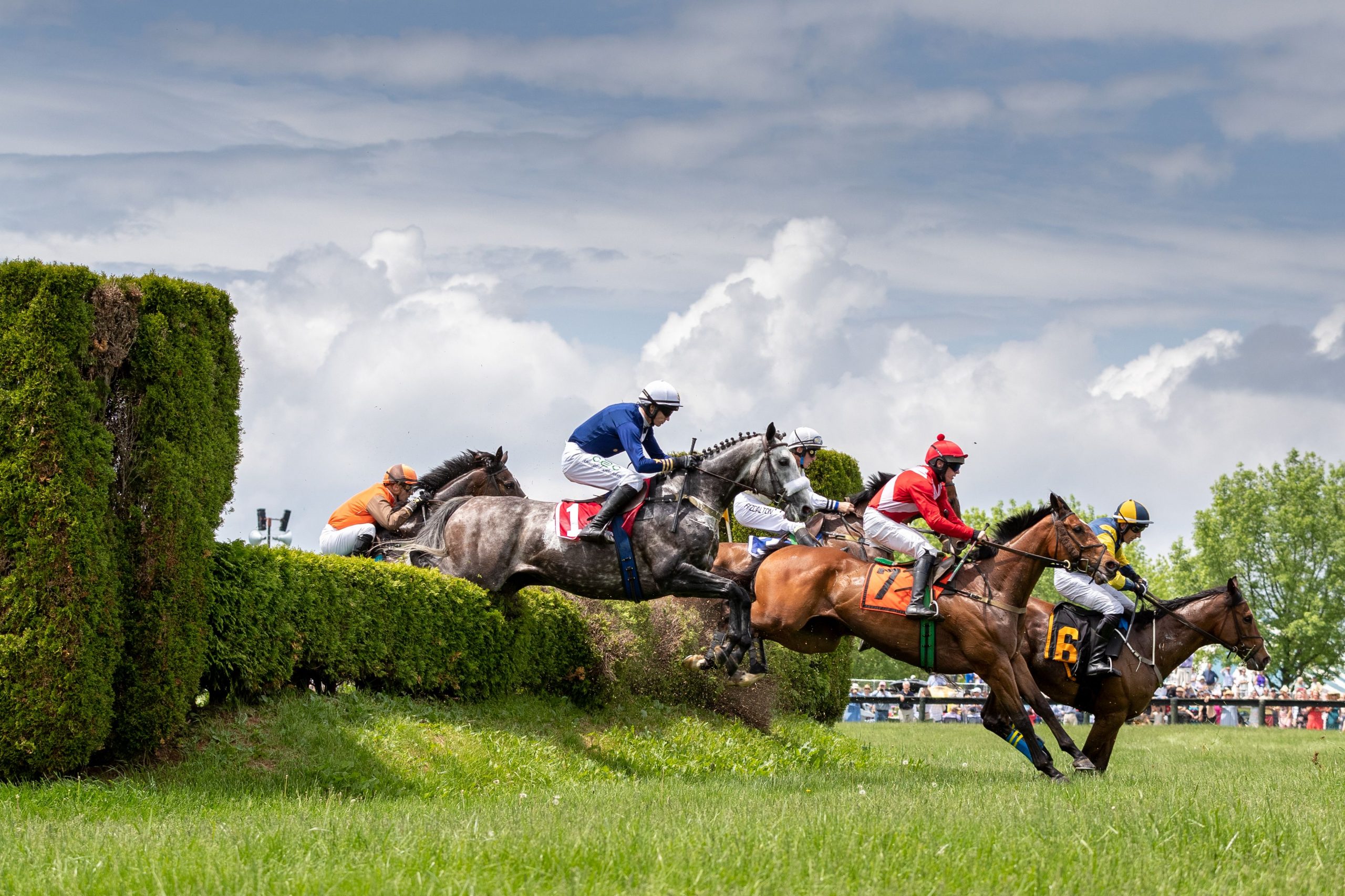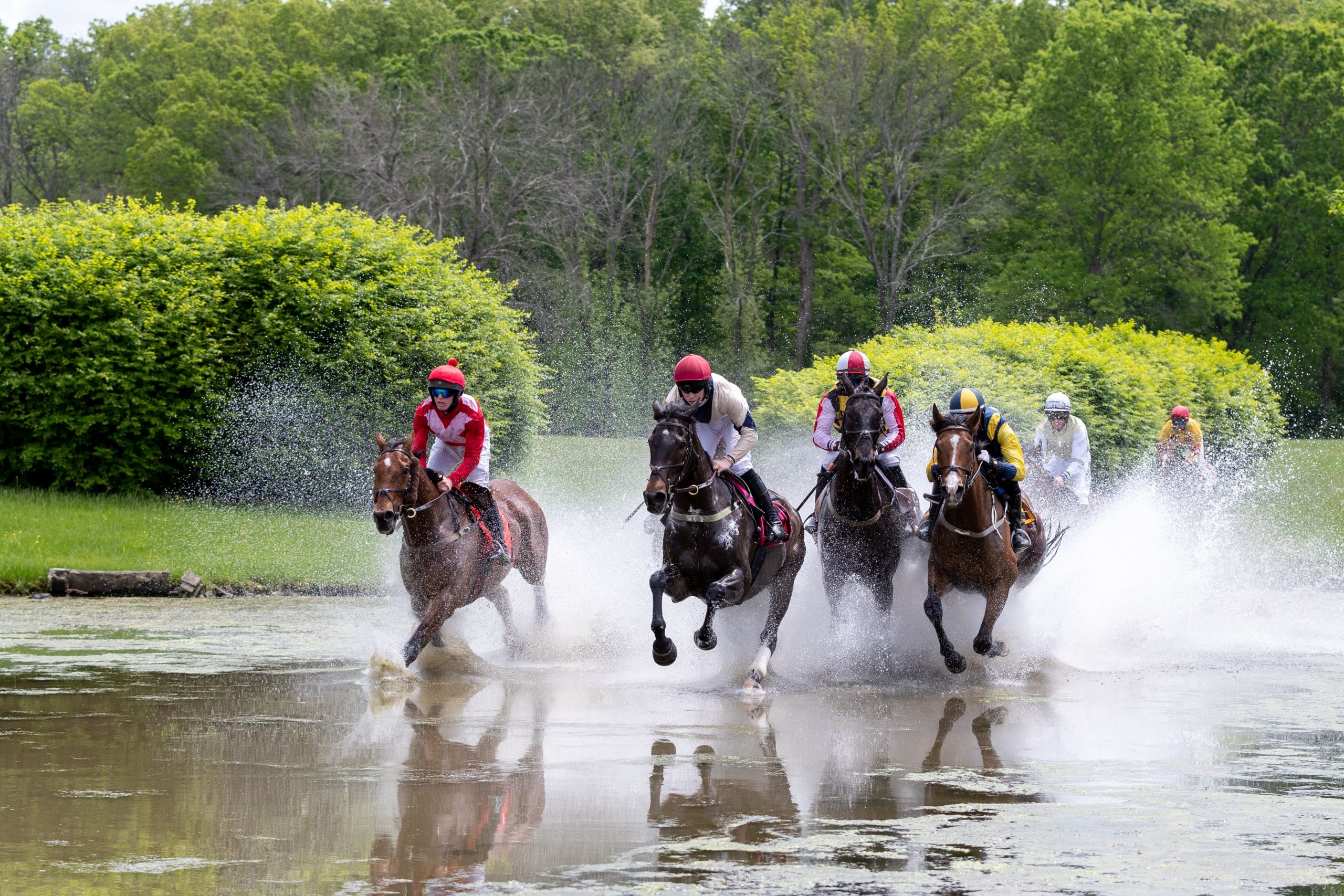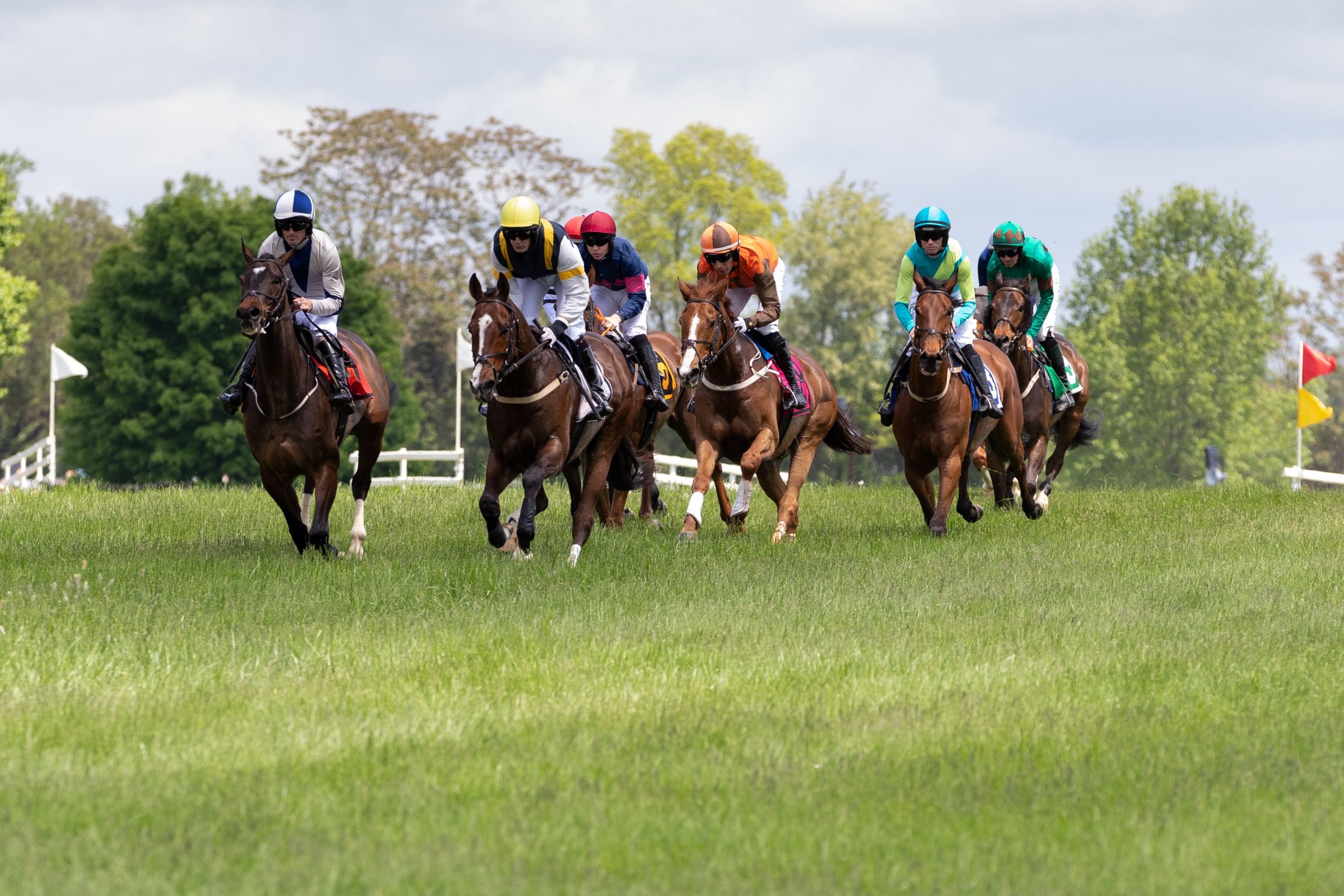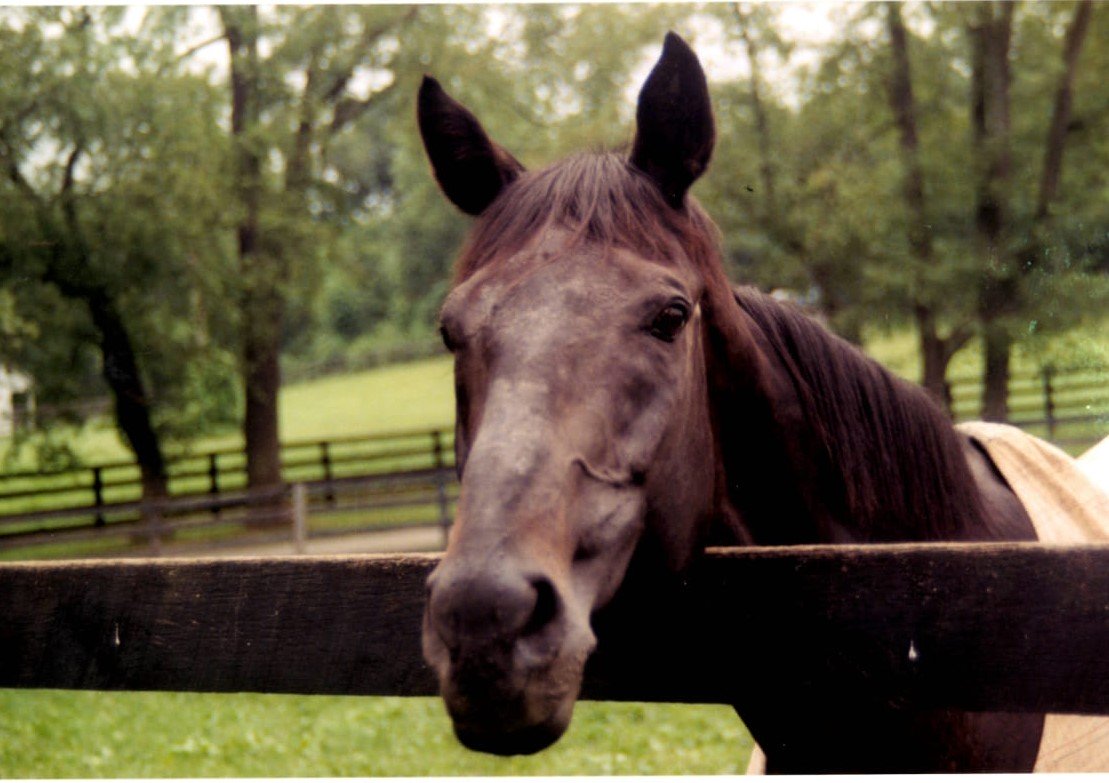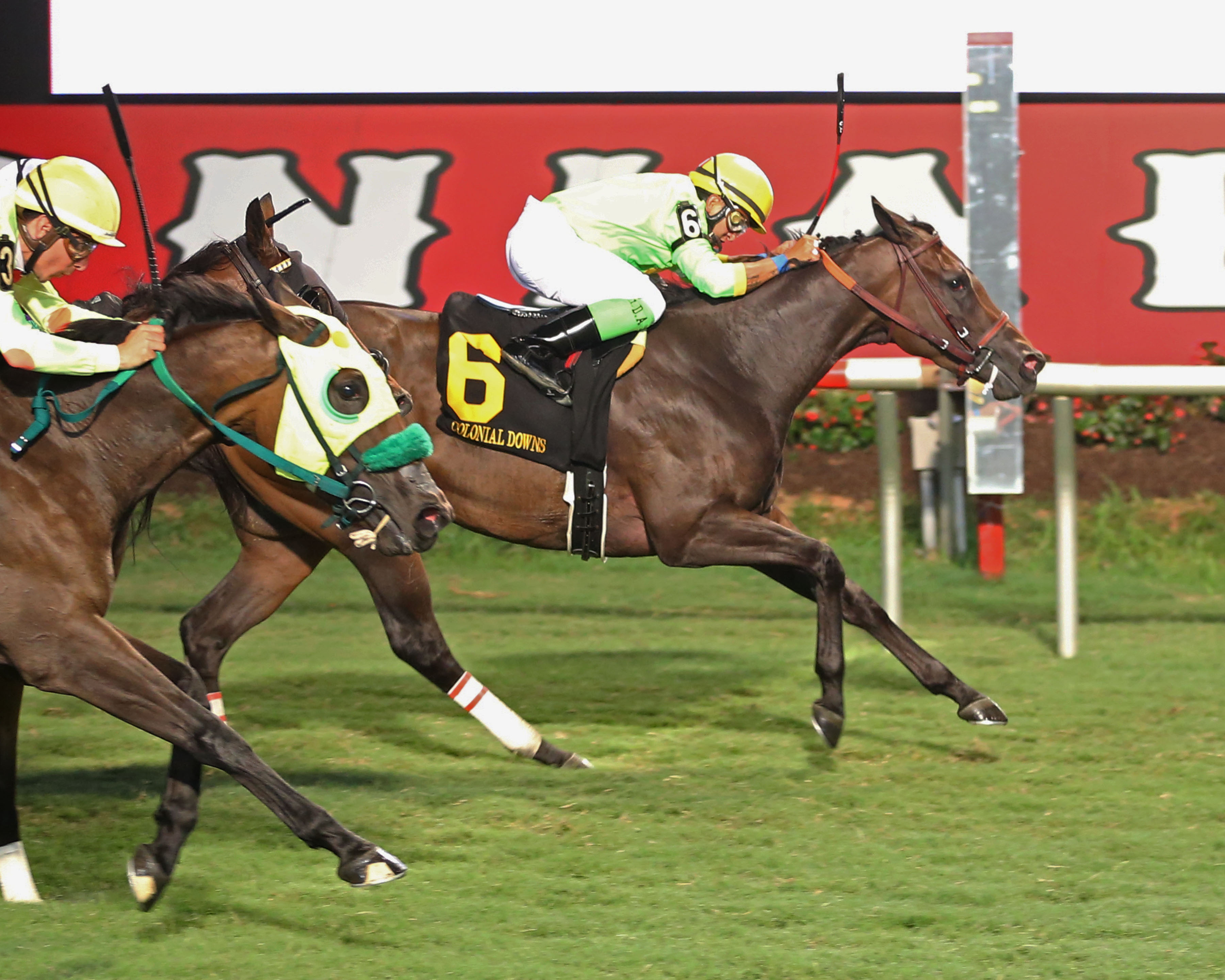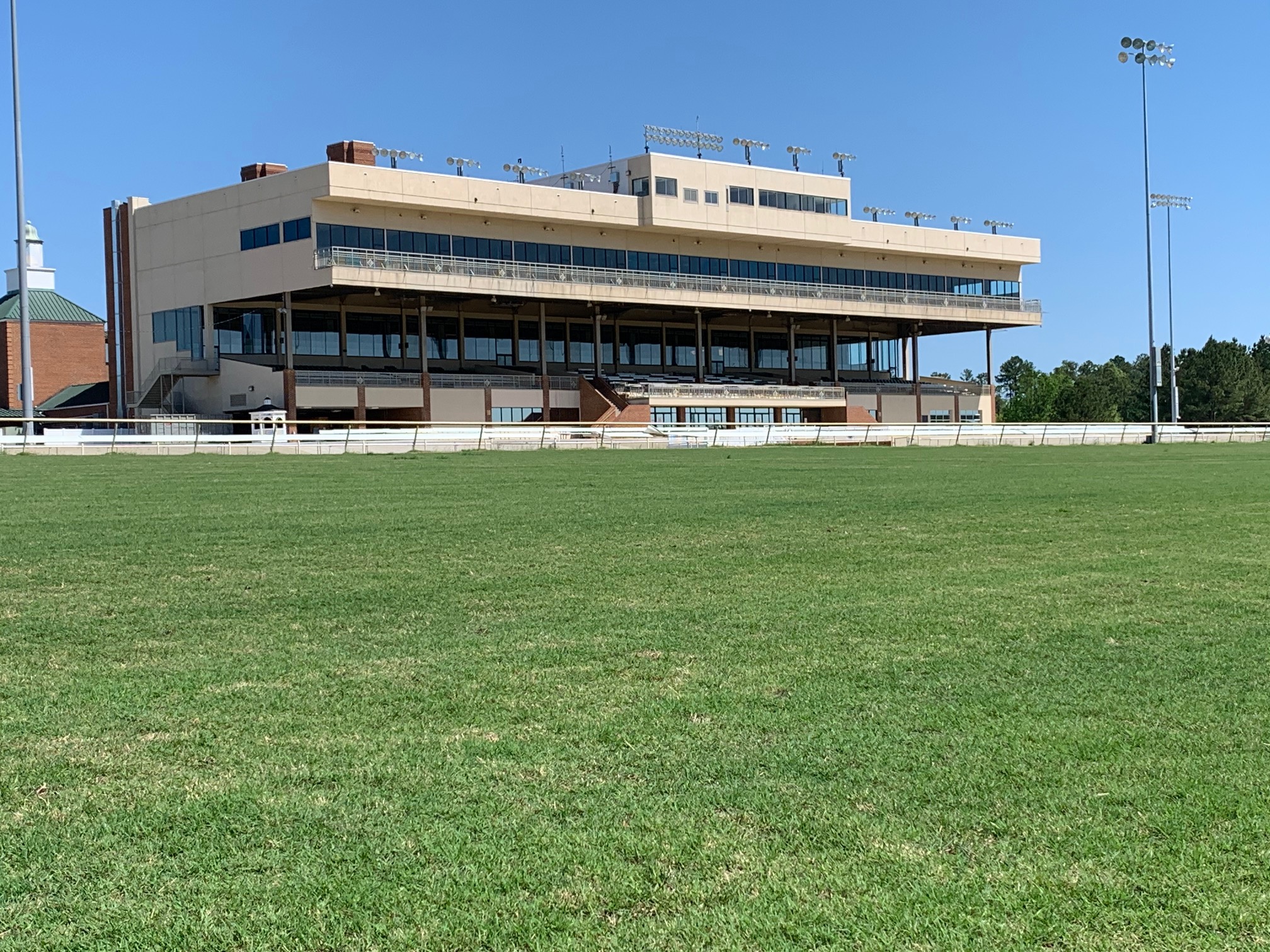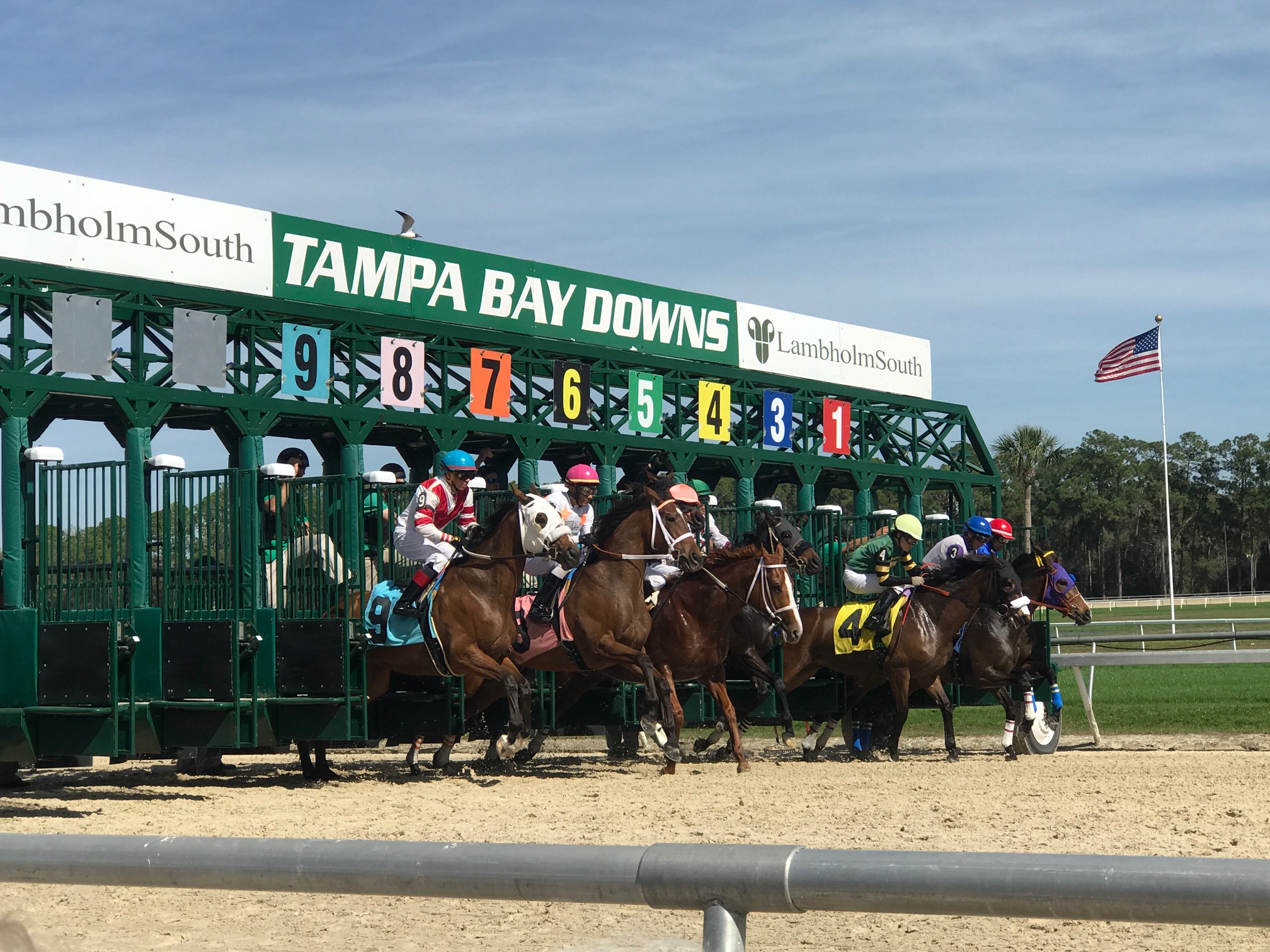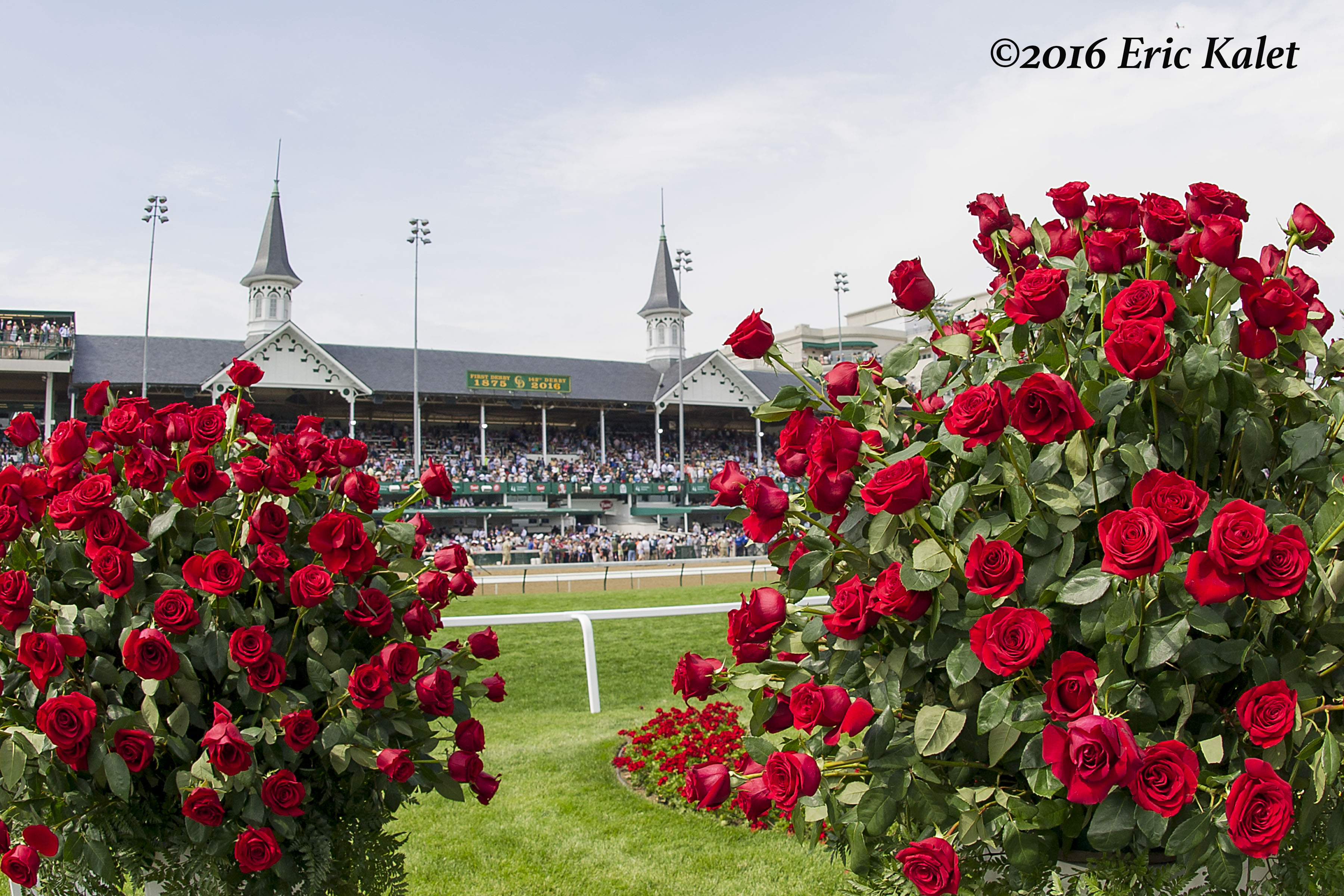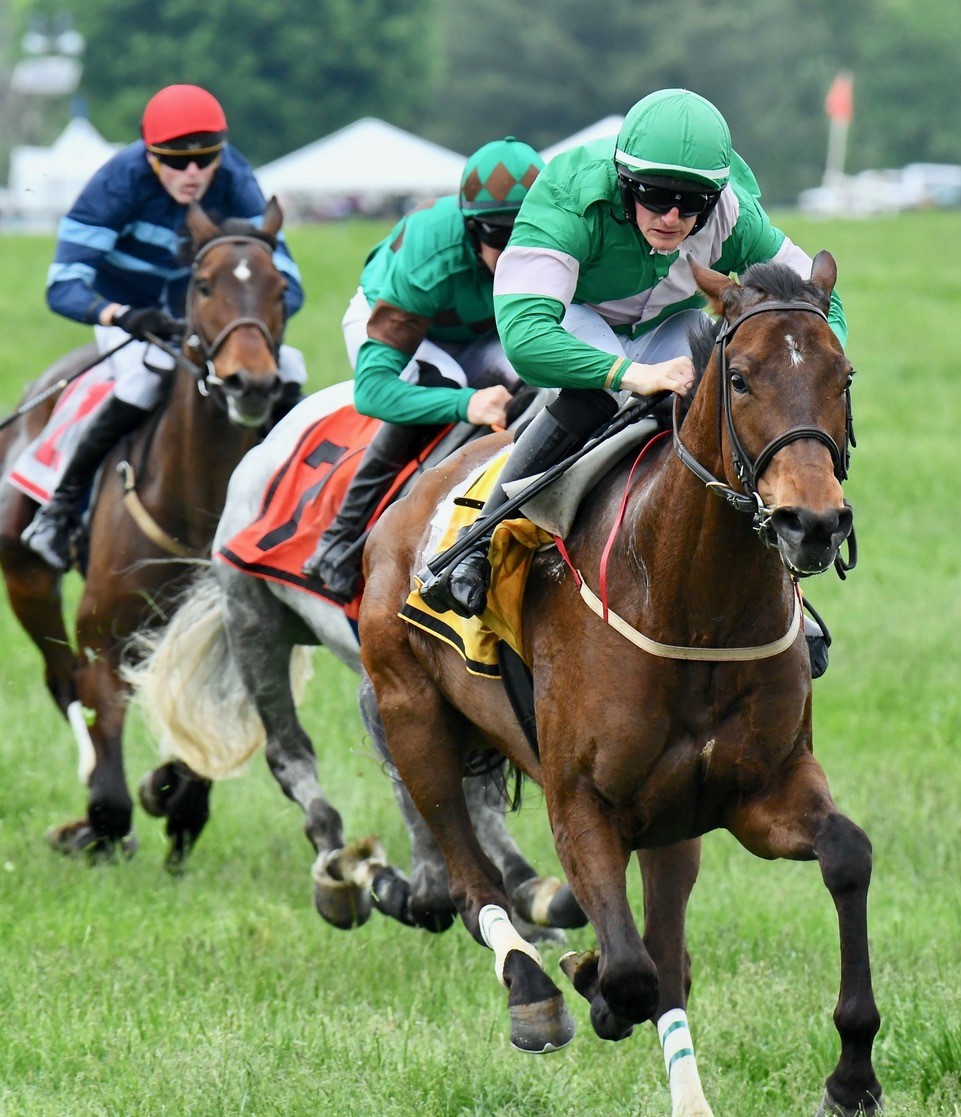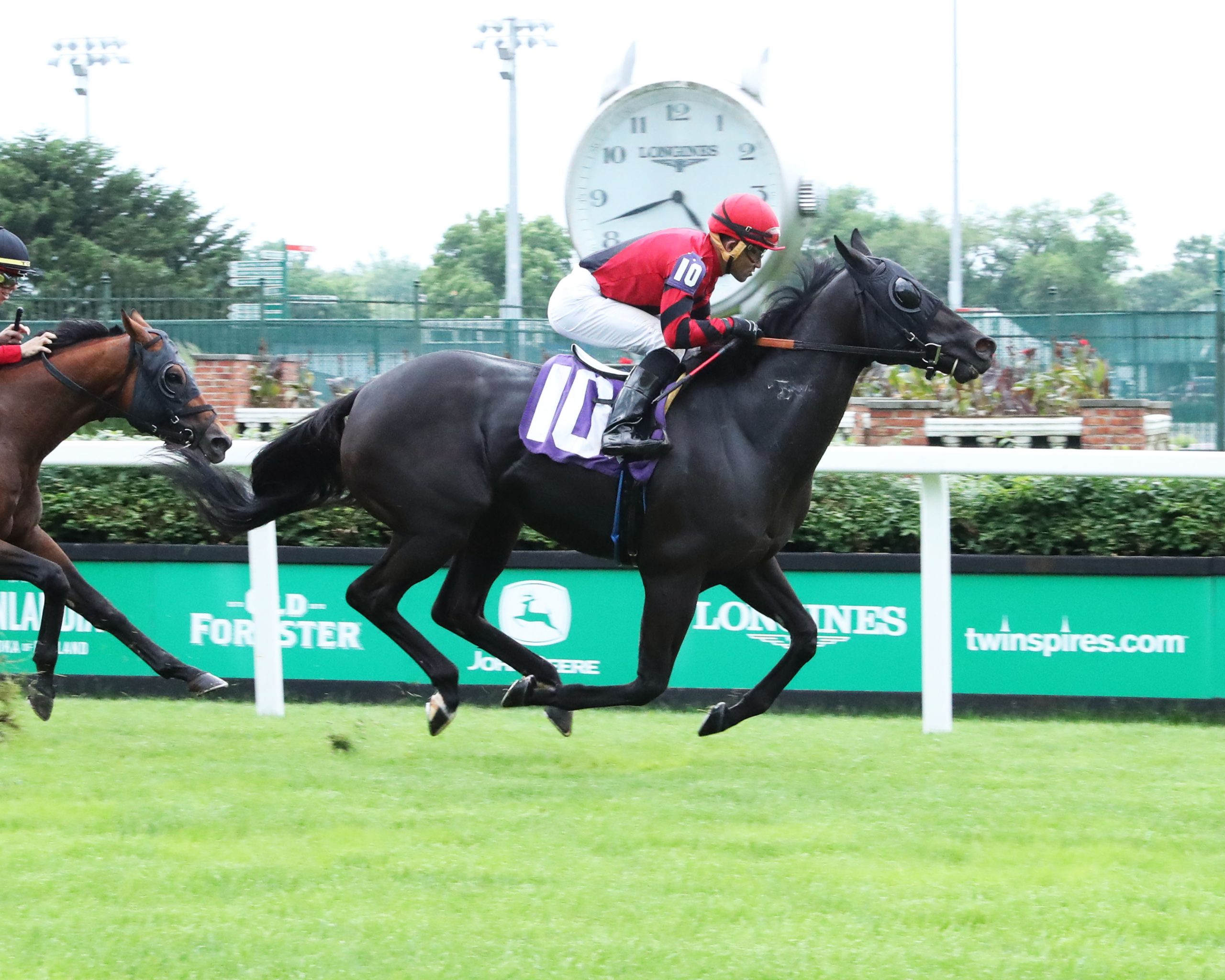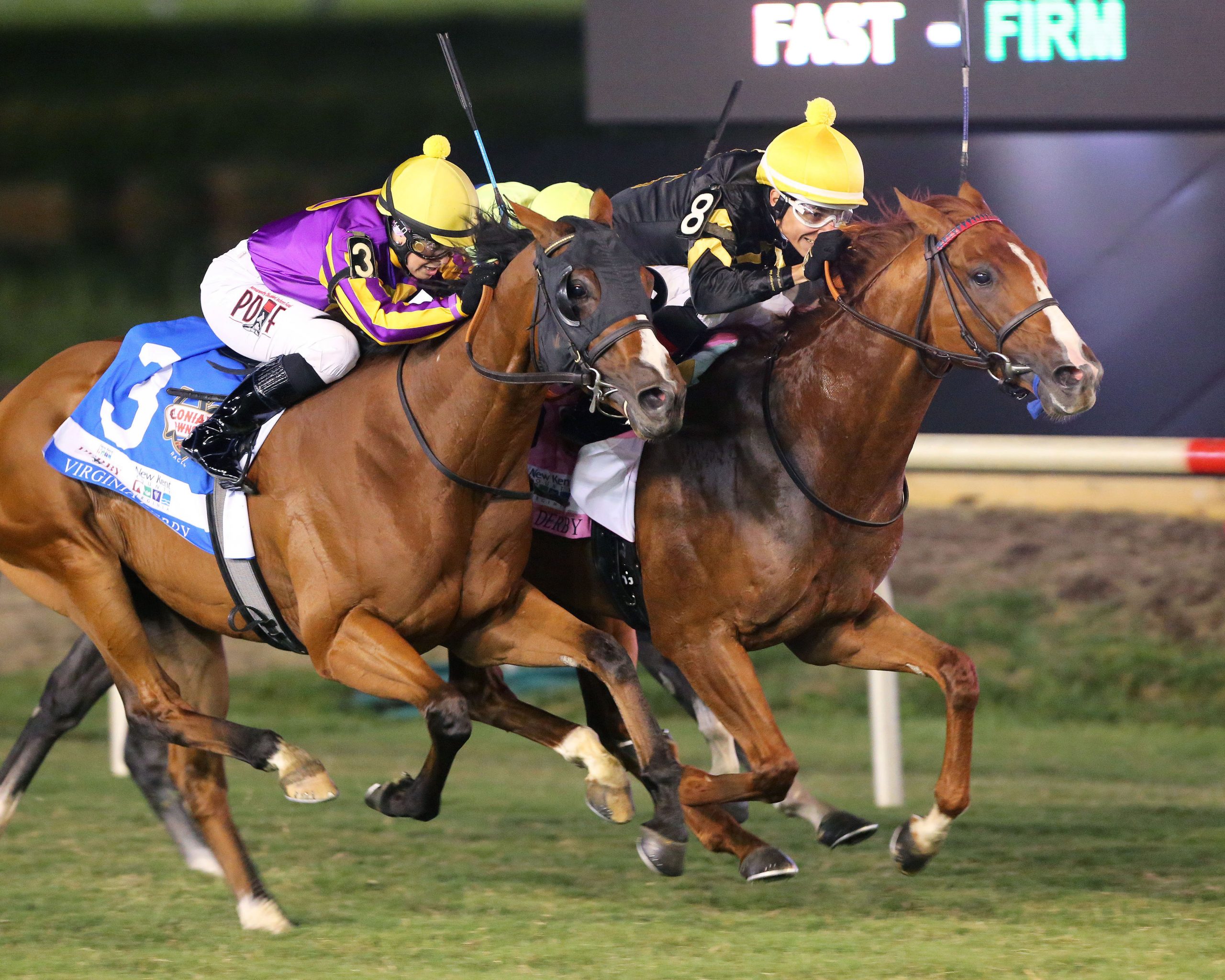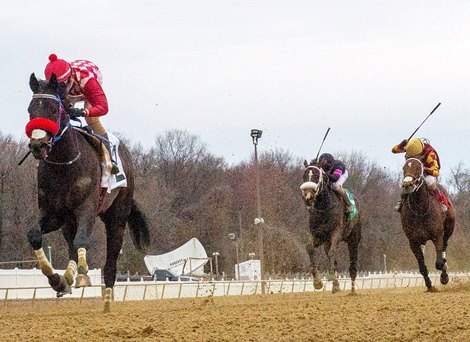The following appeared at www.nationalsteeplechase.com and was written by Don Clippinger.
Most races for Saturday’s 100th Middleburg Spring Races continued to be oversubscribed, and the meet’s traditional features were largely unchanged after scratches as the National Steeplechase Association prepares to open its coronavirus-delayed season.
Middleburg Spring will feature 11 races, and eight of them have also-eligible lists. First post time is 12:30 p.m. at Glenwood Park, and the races will be run without spectators and under strict health and safety safeguards. Broadcasts of the races will be available on the NSA website.
In all, a record 148 horses remained in the entries, with also-eligible lists limited to a maximum of four potential starters. The races offer opportunities for a broad swath of the steeplechase community’s horses in training.
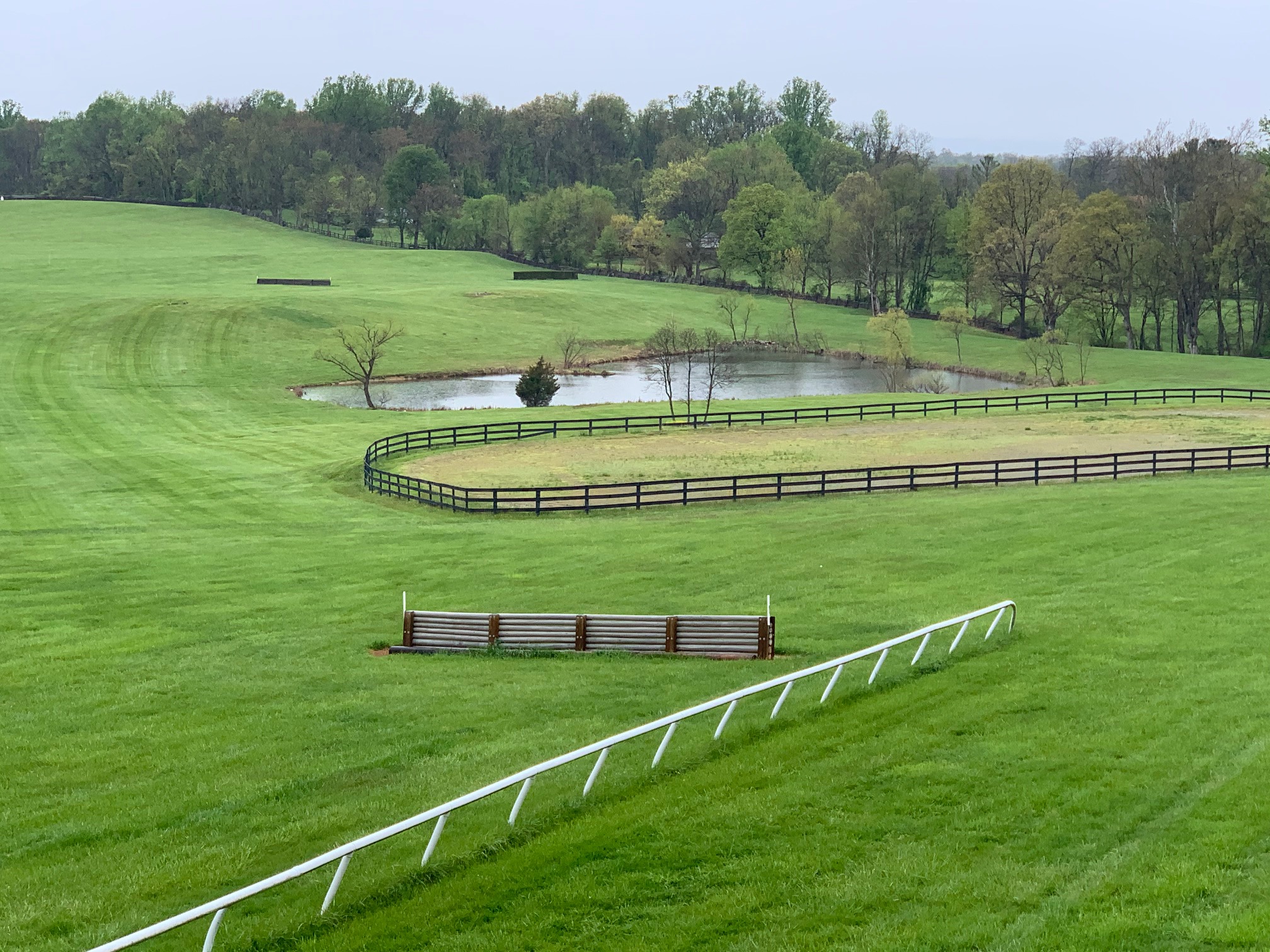
Middleburg’s grass course is 1 1/4 miles around at its outermost point.
Middleburg’s traditional feature races, the Temple Gwathmey Handicap (Gr. 3) over hurdles and the Middleburg Hunt Cup over timber, each had one scratch. Jacqueline Ohrstrom’s Winner Massagot was scratched from the 2½-mile Temple Gwathmey, which features a clash of titans including 2017 Eclipse Award champion Scorpiancer and 2018 Eclipse winner Zanjabeel.
The Middleburg Hunt Cup also spotlights two returning champions, last year’s timber leader Andi’amu and the 2017 and 2018 champion, Doc Cebu. Swansea Mile, a Grade 1 winner over hurdles, was scratched to run in Middleburg Spring’s maiden timber race.
The meet kicks off with a training flat race containing two Grade 1 winners, Stonelea Stables’ Balance the Budget (2018 Colonial Cup) and Mark W. Buyck Jr.’s Show Court (2018 A. P. Smithwick Memorial). The 1½-mile turf race will have 16 starters, with four others on the also-eligible list.
The afternoon’s second race, the Glenwood Hurdle, presents an interesting match-up of 14 maiden winners, plus four others with a chance to draw into the race. Racing Hall of Fame trainer Jonathan Sheppard will send out Hudson River Farms’ Clondaw Camp, who breezed to an overwhelming maiden victory at last fall’s International Gold Cup in his first career start.
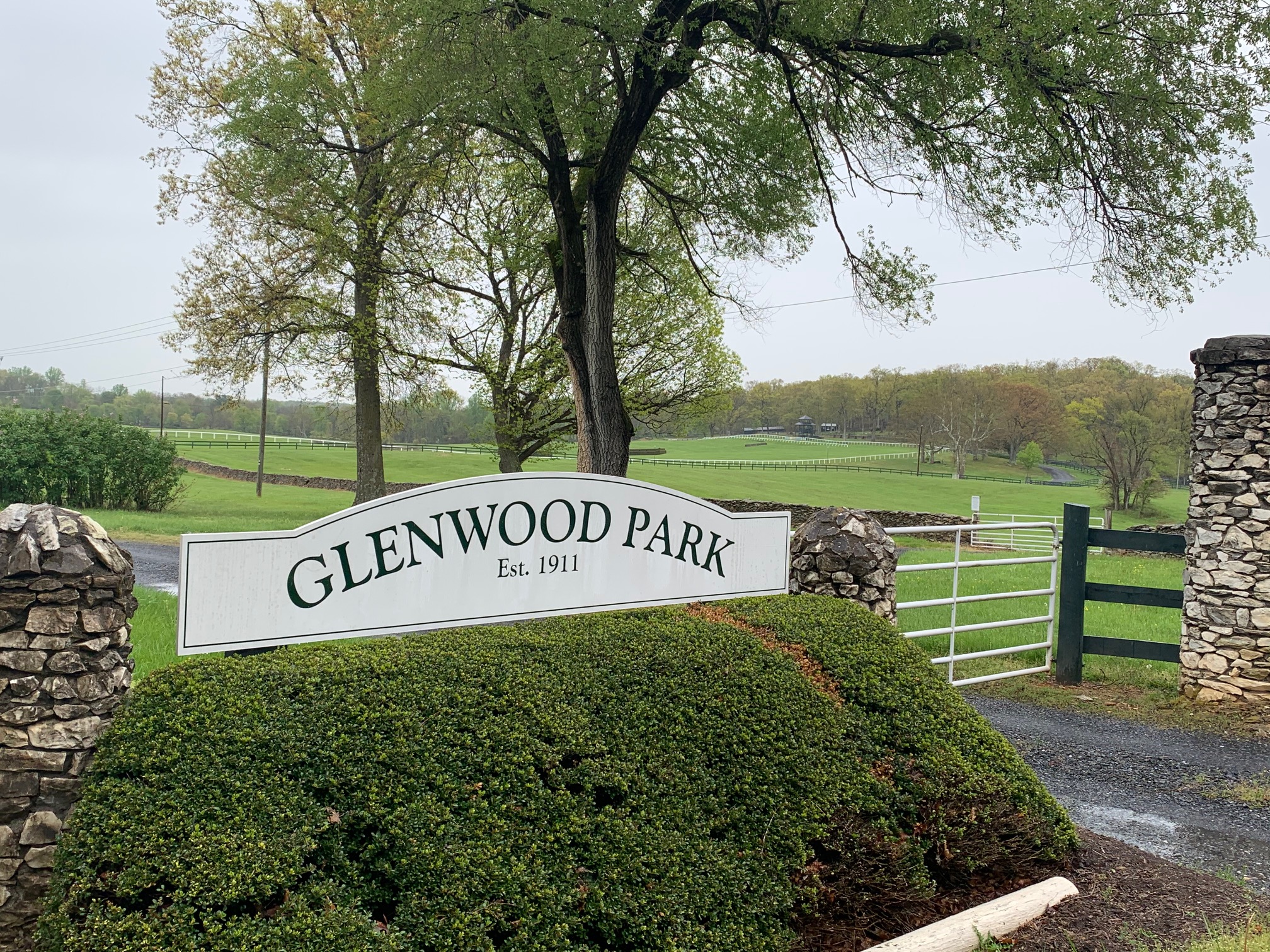
Glenwood Park will host the 100th edition of the Middleburg Spring Races, without spectators, on June 13.
Middleburg Spring will create six new winners, five over hurdles and another in the timber maiden race. The maiden special weight hurdle was split into two divisions of 10, the NSA maximum for maiden hurdle races, with four also-eligibles in each division. Also with 10 starters and four also-eligibles are two divisions of a maiden claiming hurdle.
A maiden hurdle for fillies and mares similarly will have 10 prospective starters, with four on the waiting list.
The meet concludes with a staple of Virginia steeplechase racing, a steeplethon over mixed obstacles in the Alfred M. Hunt Steeplechase. The three-mile race attracted a formidable field of 11, including Dapper Dan, Mercoeur, and Invocation, the respective first three finishers in last fall’s International Gold Cup Steeplethon Stakes. Also in the field is Kiplin Hall’s Katnap, the 2018 Hunt winner.
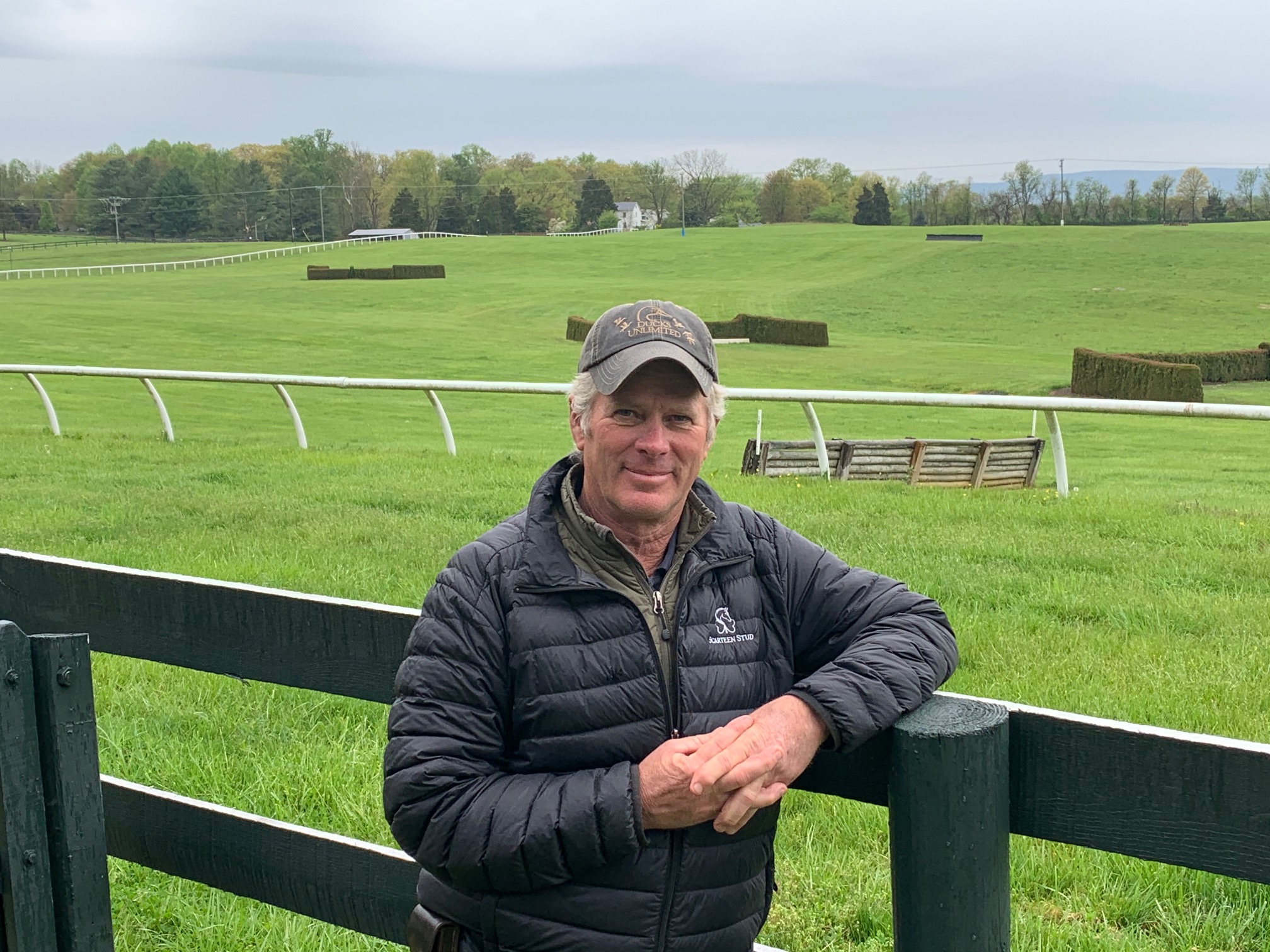
Middleburg Spring Race Association President Doug Fout is also Clerk of the Course for the Fall Races and Point-to-Points held at Glenwood Park.
Here is the field for the Temple Gwathmey Handicap after the sole scratch. The horses’ handicap weights are in parentheses at the end of their profiles.
Surprising Soul. 2012 b. g., Perfect Soul (Ire)—Elusive Surprise, by Elusive Quality. Owner: Wendy W. Hendriks. Trainer: Ricky Hendriks. Jockey: Ross Geraghty. Breeder: Charles Fipke (Ont.) 2019 record: 4-1-1-0, $133,000. 2018 record: 3-2-1-0, $97,500. 2017 record: 7-3-0-1, $106,500. Won Belmont Park’s 2019 Lonesome Glory Handicap (Gr. 1) by 3¾ lengths, then was sixth in the Grand National (Gr. 1). Finished second in 2019 Calvin Houghland Iroquois (Gr 1) after fourth in Carolina Cup Handicap, his 2019 debut. Won Saratoga’s 2018 Michael G. Walsh Novice Stakes, then was second in Far Hills’ Foxbrook Champion Hurdle division. Opened 2018 with dominant victory in Radnor’s National Hunt Cup (Gr. 3). (152)
Scorpiancer (Ire). 2009 b. g., Scorpion (Ire)—Janebailey, By Silver Patriarch. Owner: Bruton Street-US. Trainer: Jack Fisher. Jockey: Sean McDermott. Breeder: Mary O’Connor (Ire). 2019 record: 4-1-1-0, $177,000. 2018 record: No starts. 2017 record: 2-2-0-0, $150,000. Finished second in 2019 Grand National (Gr. 1). Won Calvin Houghland Iroquois (Gr. 1) for a second time in 2019 before fifth in Belmont’s Lonesome Glory Handicap (Gr. 1). Missed 2018 season and was pulled up in his first 2019 start, the Temple Gwathmey Handicap (Gr. 2). Claimed 2017 Eclipse Award with victories in Calvin Houghland Iroquois and Temple Gwathmey. Won Belmont Park’s 2016 Lonesome Glory Handicap (Gr. 1). (158)
Iranistan. 2014 dk. b. or br. g., Einstein (Brz)—Miss Vindictive, by Stephen Got Even. Owner: Hudson River Stables. Trainer: Jonathan Sheppard. Jockey: Gerard Galligan. Breeder: Crossed Sabres Farm (Ky.) 2019 record: 2-0-0-0, $3,750. 2018 NSA record: 5-3-1-1, $145,000. Champion novice 2018. In first 2019 start, pulled up in Grand National (Gr. 1) after leading early, then was fourth in Aflac Supreme Hurdle for novices. Finished game second in Saratoga’s 2018 A. P. Smithwick Memorial (Gr. 1), then was third in New York Turf Writers Cup (Gr. 1), while favored in both. Won 2018 Marcellus Frost Champion Hurdle for novices by six lengths. Skipped maiden ranks and won allowance hurdles at Carolina Cup and Middleburg Spring to begin 2018 season. Scored maiden flat victory at Delaware Park in July 2018. (140)
New Member (Ire). 2011 b. g., Alhaarth (Ire)—Sincere, by Buhhare. Owner: Armata Stables. Trainer: Jack Fisher. Jockey: Willie McCarthy. Breeder: Golden Garden Stud. 2019 record: No starts. 2018 NSA record: 4-1-0-2, $94,500. 2017 NSA record: 4-0-1-2, $28,500. Won Saratoga’s 2018 Jonathan Kiser Novice Stakes by 1 1/2 lengths, then was second in New York Turf Writers Cup Handicap (Gr. 1). Began 2018 with thirds in Carolina Cup and Queen’s Cup MPC ’Chase, then was sixth in Iroquois’ Marcellus Frost Champion Hurdle. Finished second in Belmont Park’s 2017 William Entenmann Novice Stakes after well-beaten third in Saratoga’s Michael G. Walsh Novice Stakes. Finished third in Far Hills’ Foxbrook Champion Hurdle. Had allowance and handicap wins in England in 2016. (140)
Belisarius (Ire). 2011 b. g., Montjeu—Lasting Chance, by American Chance. Owner: Gary Barber, Brous Stable, and Wachtel Racing Stable. Trainer: Kate Dalton. Jockey: Bernie Dalton. Breeders: Lynch Bages Ltd. And Camas Park Stud (Ire). 2019 NSA record: 6-0-1-1, $28,500. 2018 NSA record: 6-2-1-2, $106,200. Finished third in Saratoga’s 2019 New York Turf Writers Cup (Gr. 1) after 10th in A. P. Smithwick Memorial (Gr. 1), then was seventh in Lonesome Glory Handicap (Gr. 1) and pulled up in Foxbrook Champion Hurdle. In 2019 debut, finished second in Temple Gwathmey Handicap (Gr. 2), then was ninth in Iroquois’ Marcellus Frost Champion Hurdle for novices. Won 2018 Foxbrook Champion Hurdle by 6¼ lengths. (140)
Rashaan (Ire). 2012 ch. g., Manduro (Ger)—Red Halo (Ire), by Rainbow Quest. Owner: Bruton Street-US. Trainer: Leslie Young. Jockey: Thomas Garner. Breeder: The Aga Khan’s Studs (Ire). 2019 NSA record: 2-0-0-0, $3,000. No starts. Pulled up in 2019 Grand National (Gr. 1), then was fifth in David L. “Zeke” Ferguson Memorial Handicap (Gr. 2). Won the Keelings Irish Strawberry Hurdle in April and then was last of 18 in Galway’s Mervue Hurdle. (146)
Amschel (GB). 2014 b. g., Nathaniel (Ire)—Darinza (Fr), by Dalakhani (Ire). Owner: Irvin S. Naylor. Trainer: Cyril Murphy. Jockey: Graham Watters. Breeder: Newsells Park Stud (GB). 2019 record: 2-1-0-0, $25,500. 2018 NSA record: 1-0-0-1, $12,500. Won 2019 Noel Laing Handicap after sixth-place finish in Far Hills’ Appleton Ratings Handicap. In only other U.S. start, finished third in division of Far Hills’ 2018 Foxbrook Champion Hurdle. Won three straight races in Ireland in 2018 before export. (142)
Zanjabeel (GB). 2013 b. g., Aussie Rules—Grain Only, by Machiavellian. Owners: Rosbrian Farm and Meadow Run Farm. Trainer: Ricky Hendriks. Jockey: Darren Nagle. Breeder: Kirsten Rausing (GB). 2019 record: 1-0-0-0, $3,750. 2018 record: 4-2-2-0, $265,500. 2017 NSA record: 2-2-0-0, $120,000. In comeback race, finished fourth in 2019 David L. “Zeke” Ferguson Memorial Handicap (Gr. 2). Won 2018 Eclipse Award with victories in Lonesome Glory Handicap (Gr. 1) and Calvin Houghland Iroquois (Gr. 1). Finished second in Marion duPont Scott Colonial Cup (Gr. 1) and Temple Gwathmey Handicap (Gr. 2). Won Far Hills’ 2017 Foxbrook Champion Hurdle, his U.S. debut for former owners and trainer Gordon Elliott. For new owners, won Steeplechase at Callaway’s 2017 Aflac Supreme Hurdle. (154)
Moscato (GB). 2011 gr. or ro. g., Hernando (Fr)—Alba Stella, by Nashwan. Owner: Bruton Street-US. Trainer: Jack Fisher. Jockey: Michael Mitchell. Breeder: Miss K. Rausing (GB). 2019 record: 4-1-0-2, $105,000. 2018 record: No starts. Novice champion of 2017 returned from a year on the sidelines and won the 2019 Temple Gwathmey Handicap (Gr. 2), then was third in Calvin Houghland Iroquois (Gr. 1), eighth in Belmont Park’s Lonesome Glory Handicap (Gr. 1), and third in Grand National (Gr. 1). Won Belmont’s 2017 William Entenmann Novice Stakes and Saratoga’s Michael G. Walsh Novice Stakes impressively after strong closing second in Jonathan Kiser Novice Stakes. (152)
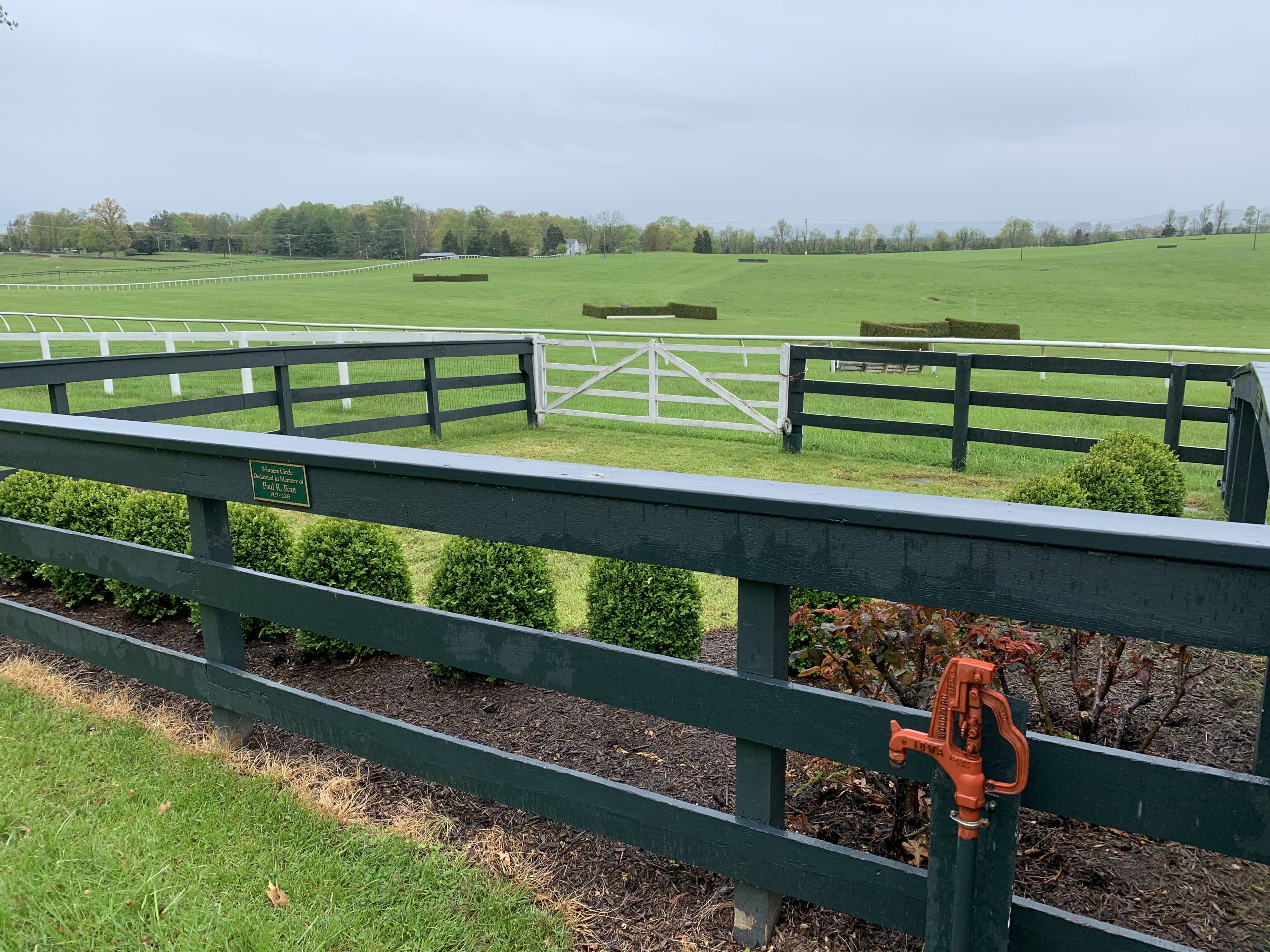
The winners circle at Glenwood Park is also named in Paul Fout’s honor.
Here is the field for the Middleburg Hunt Cup after its one scratch:
Andi’amu (Fr). 2010 b. g., Walk In The Park—Sainte Parfaite, by Septieme Ciel. Owner: Ballybristol Farm. Trainer: Leslie Young. Jockey: Thomas Garner. Breeder: Therese Bouche (Fr). 2019 record: 4-3-1-0, $115,500. 2018 record: 2-2-0-0, $36,000. Timber champion, 2019. Easily won Virginia Fall’s 2019 National Sporting Library and Museum Cup, then was second in International Gold Cup. Won the 2019 Virginia Gold Cup by three lengths and Middleburg Hunt Cup by 5¾ lengths. Won Middleburg Spring’s 2018 Alfred M. Hunt steeplethon, then added Virginia Gold Cup’s Steeplethon Stakes. Finished second in 2017 Noel Laing Handicap and third in 2017 Calvin Houghland Iroquois (Gr. 1).
Codrington College (Ire). 2010 ch. g., Duke of Marmalade—A.P. Easy, by A.P. Indy. Owner: Hudson River Farms. Trainer: Jonathan Sheppard. Jockey: Darren Nagle. Breeder: Laundry Cottage Stud Farm (Ire). 2019 record: 4-1-0-2, $22,500. 2018 record: 1-1-0-0, $9,000. Won Shawan Downs’ 2019 Brown Advisory Legacy Chase, then was fourth in International Gold Cup. Finished third in Grand National’s 2019 Western Run Plate and in Iroquois Steeplechase’s Mason Houghland Memorial. Won his timber debut at 2018 Queen’s Cup.
Super Saturday. 2009 gr. or ro. g., Any Given Saturday—Lady Aloma, by Cozzene. Owner: Irvin S. Naylor. Trainer: Kathy Neilson. Jockey: Gerard Galligan. Breeder: Walton Breeders (Ky.) 2019 record: 3-0-1-3, $29,900. 2018 record: 6-1-2-1, $51,800. 2017 record: 6-0-1-1, $13,400. Finished second in Virginia Fall’s 2019 National Sporting Library and Museum Cup, then was third in International Gold Cup and Pennsylvania Hunt Cup. Finished third in 2019 Virginia Gold Cup, then fell in Radnor Hunt Cup. Finished fifth in Middleburg Hunt Cup. Finished second in 2018 International Gold Cup and Pennsylvania Hunt Cup. Won the 2018 Middleburg Hunt Cup, then was third in the Virginia Gold Cup and fourth in Radnor Hunt Cup.
Doc Cebu. 2010 b. g., Hard Spun—Berga, by Jade Hunter. Owners: Charles C. Fenwick Jr., Michael Hankin, and Charles Noell. Trainer: Jack Fisher. Jockey: Michael Mitchell. Breeder: Graceville Breeding (Ky.) 2019 record: 1-0-0-0, $0. 2018 record: 5-4-0-1, $102,000. 2017 record: 5-4-1-0, $96,600. Timber champion, 2017, 2018. Finished fourth in 2019 Virginia Gold Cup after losing rider late in My Lady’s Manor. Won International Gold Cup for a second time to lock up 2018 timber title. Also won Shawan Downs’ 2018 Brown Advisory Legacy Chase by 3 1/2 lengths and scored a second victory in the Genesee Valley Hunt Cup by seven lengths. Won Willowdale Steeplechase for a second straight year in 2018 after third in Middleburg Hunt Cup. Clinched 2017 timber championship with 11-length victory in International Gold Cup.
Shinobi (Ger). 2012 b. g., Lord Shanakill—Singuna, by Black Sam Bellamy. Owner: Irvin S. Naylor. Trainer: Kathy Neilson. Jockey: Skylar McKenna. Breeder: Stifung Gestut Fahrhof (Ger). 2019 record: 2-0-0-0, $500. 2018 record: 1-1-0-0, $9,000. 2017 record: 3-0-1-0, $4,800. Finished fourth in 2019 Genesee Valley timber allowance and then was pulled up in similar Pennsylvania Hunt Cup race. Won a division of the John Rush Streett Memorial maiden timber race at the 2018 My Lady’s Manor meet. Finished second over hurdles in a 2017 Willowdale claiming hurdle, his first start over fences.
Schoodic. 2010 b. g., Tiznow—Aunt Henny, by Hennessy. Owner: Dolly Fisher. Trainer: Jack Fisher. Jockey: Willie McCarthy. Breeder: Edith R. Dixon (Ky.) 2019 record: 6-5-1-0, $109,500. 2018 record: 6-0-1-2, $35,800. Won the 2019 International Gold Cup and Genesee Valley Hunt Cup. Opened his timber career in 2019 with three straight victories, including 16¾-length romp in Iroquois Steeplechase’s Mason Houghland Memorial and an open-length win in Fair Hill novice timber, then was second in Shawan Downs’ Brown Advisory Legacy Chase. Was a Grade 2 winner and Grade 1-placed over hurdles.
Curve of Stones 2011 gr. or ro. g., Arch—Exceptionally, by El Prado (Ire). Owner: Sarah Rebecca Shepherd. Trainer: David M. Bourke. Jockey: Barry Foley. Breeder: Audley Farm (Va.) 2019 record: 6-1-1-0, $21,800. 2018 record: 3-0-0-0, $2,100. 2017 record: 8-0-0-1, $18,100. Finished second in Callaway Gardens timber allowance after fifth in International Gold Cup. Won timber maiden at 2019 Virginia Fall meet. Switched to steeplethons in 2019 and finished fifth at Middleburg Spring and fourth at the Virginia Gold Cup.


